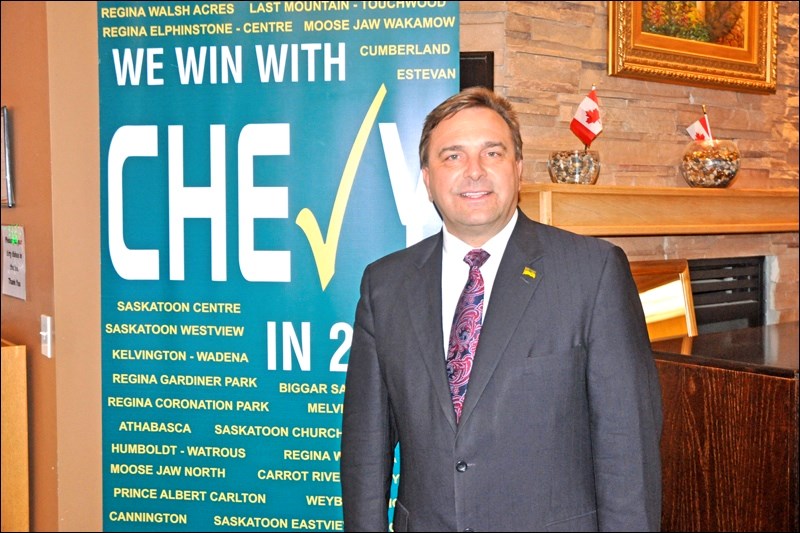The Northwest region has turned out to be a central focus for the Saskatchewan Party leadership bid of Ken Cheveldayoff.
The Saskatoon Willowgrove MLA, who grew up in Blaine Lake, was back in the Battlefords again last Thursday for the leadership debate involving five of the contenders at the Dekker Centre.
It is no accident that Cheveldayoff had been focusing on the region. He believes his campaign has considerable strength in the northwest, largely due to his long ties to the region.
“I played sports all through the Hafford, Maymont, Borden, Radisson, Battlefords area growing up, so it’s like coming home for me,” said Cheveldayoff, who spoke to the Regional Optimist prior to the Dekker Centre debate.
Right after announcing his leadership bid in late August, Cheveldayoff’s first road trip of the campaign took him through the Battlefords up to Meadow Lake. That was followed by a reception at the Blend in North Battleford Sept. 6, an event where Cheveldayoff actively sought potential supporters in the community.
“Since that time I’ve got a very, very strong team here in the Battlefords, knocking on doors and selling memberships,” said Cheveldayoff.
The candidate made clear he felt it was important for him to get a big showing from the Northwest region of the province in his bid to win the leadership vote on Jan. 27.
“It’s really important to me. I have a lot of strength in northwestern Saskatchewan because this is where I grew up. I know people in virtually every community in northwestern Saskatchewan.”
One of the places in the northwest region that he has visited is Paradise Hill. He and Colleen Young, MLA for Lloydminster, took part in a special town hall meeting focusing on public safety issues on Nov. 10, a week before the Battlefords debate.
“There were 500 people out for an event Colleen organized about crime in rural Saskatchewan,” said Cheveldayoff.
The meeting touched a range of issues, but one issue that resonated for Cheveldayoff was concern about marijuana and the pace of the federal government’s legalization efforts.
Cheveldayoff has come forward with his own policies on marijuana as well to address those concerns raised; one policy he proposes is setting a minimum age of 25 to be able to purchase marijuana. Cheveldayoff said the province’s children’s advocate, Corey O’Soup, has agreed with that idea.
“The strong concern that’s out there from teachers, from parents, from business people, from the whole community, just because the Prime Minister wants it to come in to our province here, I think we have to be really careful how we do it.”
He found the entire crime meeting in Paradise Hill productive, and emphasized that he would be “tough on crime” as Premier.
Another of his policies which he says is “really resonating” with people is his proposal to increase Internet services by 225 per cent, with expanded services for towns, villages and rural areas. He says there has been very strong support for that idea.
Cheveldayoff also has continued his “listening tour” of the province, with education the topic at a forum held in Regina on Saturday just after his North Battleford stop.
Also after his North Battleford appearance, news broke about how well the Cheveldayoff campaign had been doing in the fundraising department.
Numbers were released by the Sask Party showing Cheveldayoff in first place in overall fundraising at $177,528 as of Oct. 31, well ahead of Scott Moe who is in second place.
The numbers surprised observers who saw Scott Moe and Alanna Koch as frontrunners in the race based on their support from caucus and party figures. Moe enjoys the backing of over 20 members of caucus, the largest number of endorsements of any candidate in the race.
However, Cheveldayoff emphasizes that ultimately it is grassroots members, not party insiders, who will make the final determination about who wins the leadership.
“This campaign, it’s not about the establishment and who the establishment wants to win,” said Cheveldayoff.
“It’s not about endorsements, and how many endorsements that you have. I’m very proud of the MLAs that are endorsing me, but it’s really not about that. It’s about the individual members, and that’s who’s going to choose. The grassroots voter is going to be responsible for choosing the next premier of the province.”



